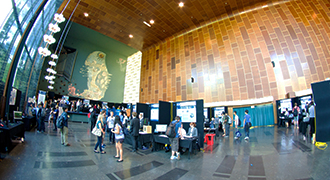Expo shows new wave, young minds
Some of the projects displayed at the University of Melbourne’s Endeavour Design Expo could soon change the face of robotics, medicine, or many other industries.
Mind-boggling innovations from a few of the most talented students in the country have been gathered for the exposition of emergent engineering expertise.
More than 100 exemplary final year Engineering projects were viewed for the first time; covering the environmental, biomedical, computer simulation, and robotics fields, to sustainability projects in developing countries.
One of the judges this year has already changed the world by inventing the USB memory stick.
Theodore, a robotic teddy-bear that detects human motion and mimics their actions has entranced and inspired expo-goers.
A monitoring system that may one day predict epileptic seizures before they happen was on show this year too.
A remote-controlled multi-rotor helicopter capable of extraordinarily high-definition filming, captured the events and no doubt inspired budding aerial filmmakers.
The Endeavour Expo shot for a number of goals, including the aim to build interest in engineering and technology among school students, particularly females.
Students had the opportunity to view, interact and learn about a wide variety of projects undertaken by the final-year students.
“Engineering is visible in every aspect of our lives and we need to communicate this more widely. Engineering changes lives, improves health and makes our lives easier. We also want to show that Engineering is fun,” said Dean of the Melbourne School of Engineering, Professor Iven Mareels.








 Print
Print